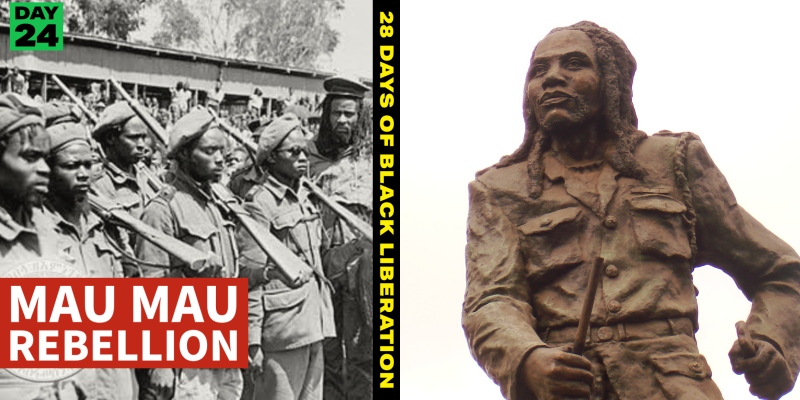Day 24 of the 28 Days of Black Liberation 2023 series
The story of the Mau Mau Rebellion is one of anti-colonial struggle and resistance. At the start of the twentieth century, the East African country of Kenya was colonized by European settlers. The settlers focused primarily on the fertile central highlands in order to farm coffee and tea. Their desire to plunder these resources meant the displacement of large numbers of the Kikuyu tribe who had worked the land as migratory farmers for centuries.
When Kenya officially became a crown colony of the British government in 1920, the British promised reforms and greater independence for colonies if the Kenyans agreed to help support the mother country. Eventually, however, it became clear that the British had no intention of implementing said reforms and the colonies were given no assistance or aid. Instead, the settlers introduced various restrictions on land ownership and agricultural practices including a high poll tax, a tight restriction upon African ownership of land, and a ban on certain profitable commercial crops. Three thousand European families owned more arable land in the highlands than was available to the one million Kikuyu in their reserves.
By the early 1950s, resentment peaked amongst the Kikuyu tribe against the British settlers and several protests were organized against colonial rule. In 1952, a State of Emergency was declared in Kenya as resistance fighters began attacking Kikuyu members who expressed loyalty to the British government, European farmers, and civil authorities.
Initially, the British responded by detaining leaders of the Mau Mau Rebellion but eventually they launched an all-out military attack on the resistance fighters. The Rebellion disintegrated shortly after the slaughter of 11,000 rebels by the British government. The Kenya Human Rights Commission reports that 90,000 Kenyans were executed, tortured, or maimed during the crackdown, and 160,000 were detained. Only thirty-two settlers were killed. It is widely accepted that the Mau Mau Rebellion contributed to the expediency of Kenyan independence. Today, there have been multiple legal suits made against the British government to provide reparations for those affected by the violent atrocities made in the name of colonial rule.
It is better to die on our feet than live on our knees for fear of colonial rule.
Mau Mau leader Dedan Kimathi

